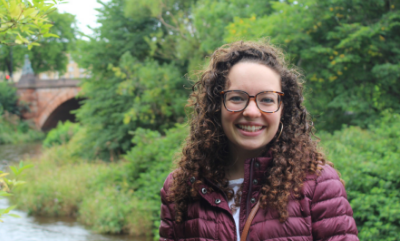Bringing Resources to Neighborhoods Historically Left Out of the Conversation.

Kelly Danckert Health Communication & Promotion and Human Rights & Social Justice
Breakfast: Usually a smoothie on the go!
Hometown: Randolph, MA
Extracurriculars: Listening to Pod Save America, reading, and cooking
To learn more about how our students are being activists in their communities, we started sending out a short survey in our weekly e-mails to the BUSPH student body. We sat down with first-year student Kelly Danckert to hear more about her work as an Ambassador for Greenovate Boston.
What are you working on to improve the health of your community?
I volunteer as an Ambassador for Greenovate Boston, which is an initiative within the City of Boston’s environmental department, that aims to get all Bostonians involved in eliminating the pollution that causes global climate change while continuing to make Boston a healthy, thriving, and innovative city.
Through the Ambassador Program, I’m partnering with All In Energy, a non-profit that focuses on equitable access to clean energy, to connect renters in Dorchester to the Mass Save program. The Mass Save program is an awesome resource that conducts home energy audits for renters and homeowners and will replace energy inefficient lightbulbs, showerheads, thermostats, and power strips at no cost to reduce home energy use and utility costs. However, not many people know this resource exists, particularly low-income renters in traditionally underserved communities. Through a mix of canvassing Dorchester neighborhoods, hosting workshops, and convening together a group of stakeholders in the housing, energy, and community development sectors, we are trying to bring these energy savings to neighborhoods that have historically been left out of the conversation.
This is important because lower-income communities are receiving lower energy efficiency savings than more affluent neighborhoods, so they are not only more burdened by utility bills, but they also tend to be relying on outdated heating and cooling systems that are bad for the environment and bad for respiratory health.
What led you to be interested in this work?
I’m really interested in the effect climate change has on health, particularly when it comes to exacerbating existing health disparities. At first, when I started volunteering with Greenovate, I was leading community trainings around what the city is doing to become more climate resilient and how community members can get involved in these efforts. Through this, I learned a lot about initiatives like zero waste, smart energy, and carbon-free Boston. I became really interested in smart energy, especially around how energy accessibility is a social justice issue and also a public health issue. When we talk about people who are left out of these opportunities to take advantage of energy saving programs, we’re talking about the same people who live in historically marginalized and underserved communities in Boston, who have higher rates of asthma, who live in places without access to fresh food, and who are more burdened by the effects of climate change. All of these factors contribute to overall health and well-being, so connecting more residents to support and resources around clean energy is a way we can address many overarching determinants of health.
Do you plan on continuing this work in your career after SPH? How?
Yes! I love the work that Greenovate is doing, and it’s something I’m really invested in. One of the major reasons many people don’t take advantage of the Mass Save program is because they don’t know about it, which is really a failing on our part when it comes to going into these communities intentionally and communicating these opportunities. I really hope that by studying Health Communication and Promotion along with Social Justice and Human Rights here at BUSPH, I can continue to do this work in a larger capacity after graduation. Energy savings is an interesting issue to work on because when we look at it in a larger context, it is such a complex and multifaceted issue that touches on environmental justice, health equity, and social justice.
How can other students get involved?
If people are interested in getting involved, there are plenty of opportunities to plug in! Greenovate Boston is getting ready to launch their next cohort of Climate Ready Boston Leaders, where they train local leaders to lead conversations about climate preparedness. People can also sign up for their email list to receive updates on volunteer opportunities like the Urban Moor Cleanups that happen in the spring. However, there are also plenty of ways to get involved right now! If you want to work on canvassing Dorchester neighborhoods and assisting with our workshops on smart energy use, you can email me directly for more information.